Kirkwood street closure, parklet program OK’d again for 2022, no permanent closure yet
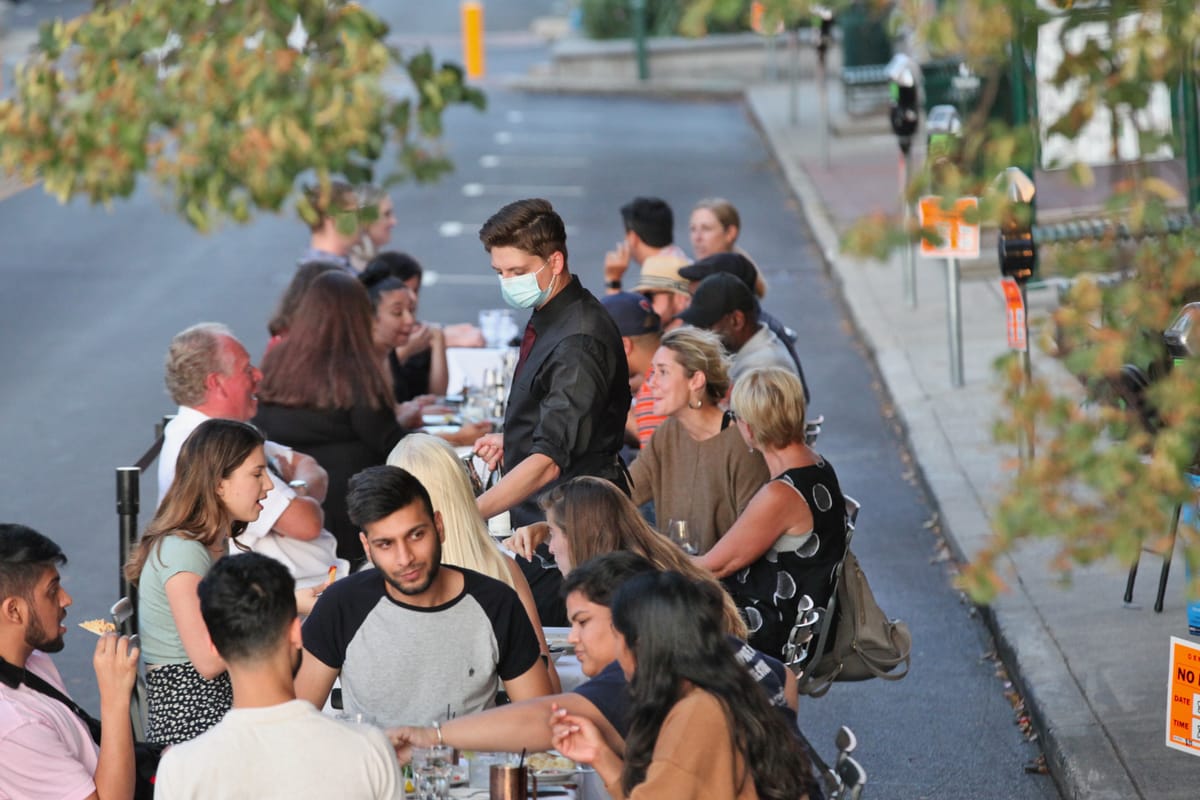
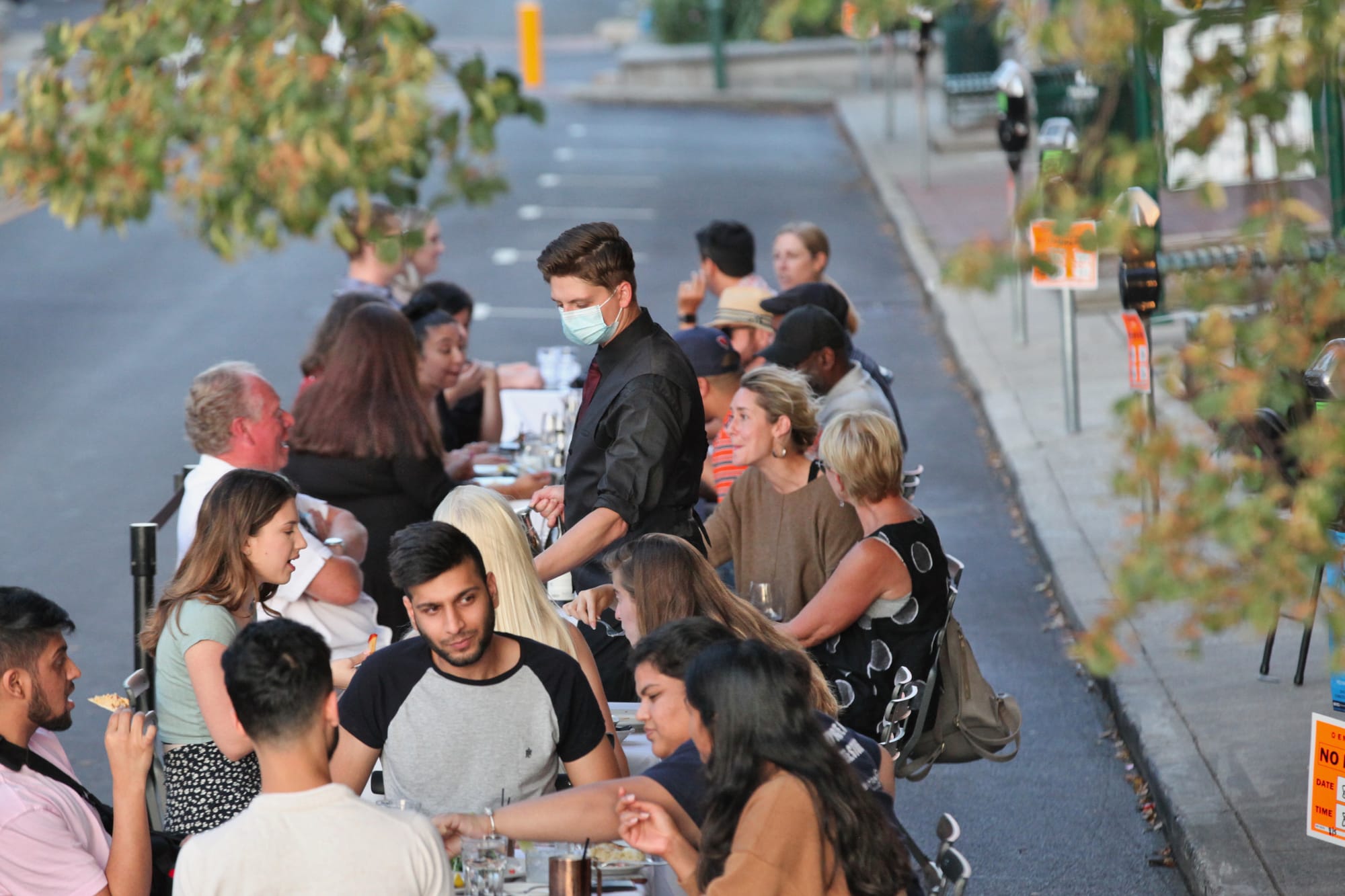
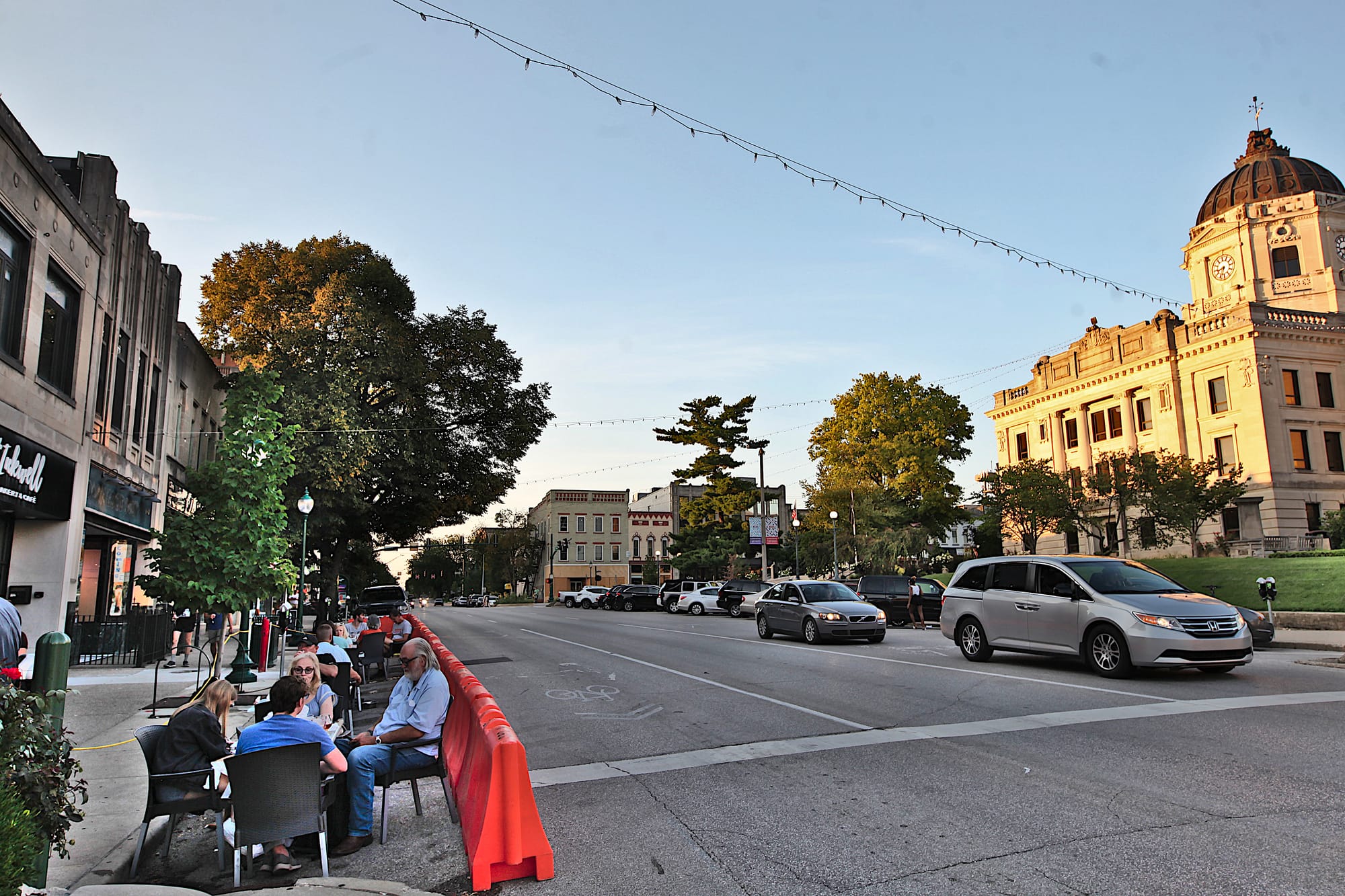
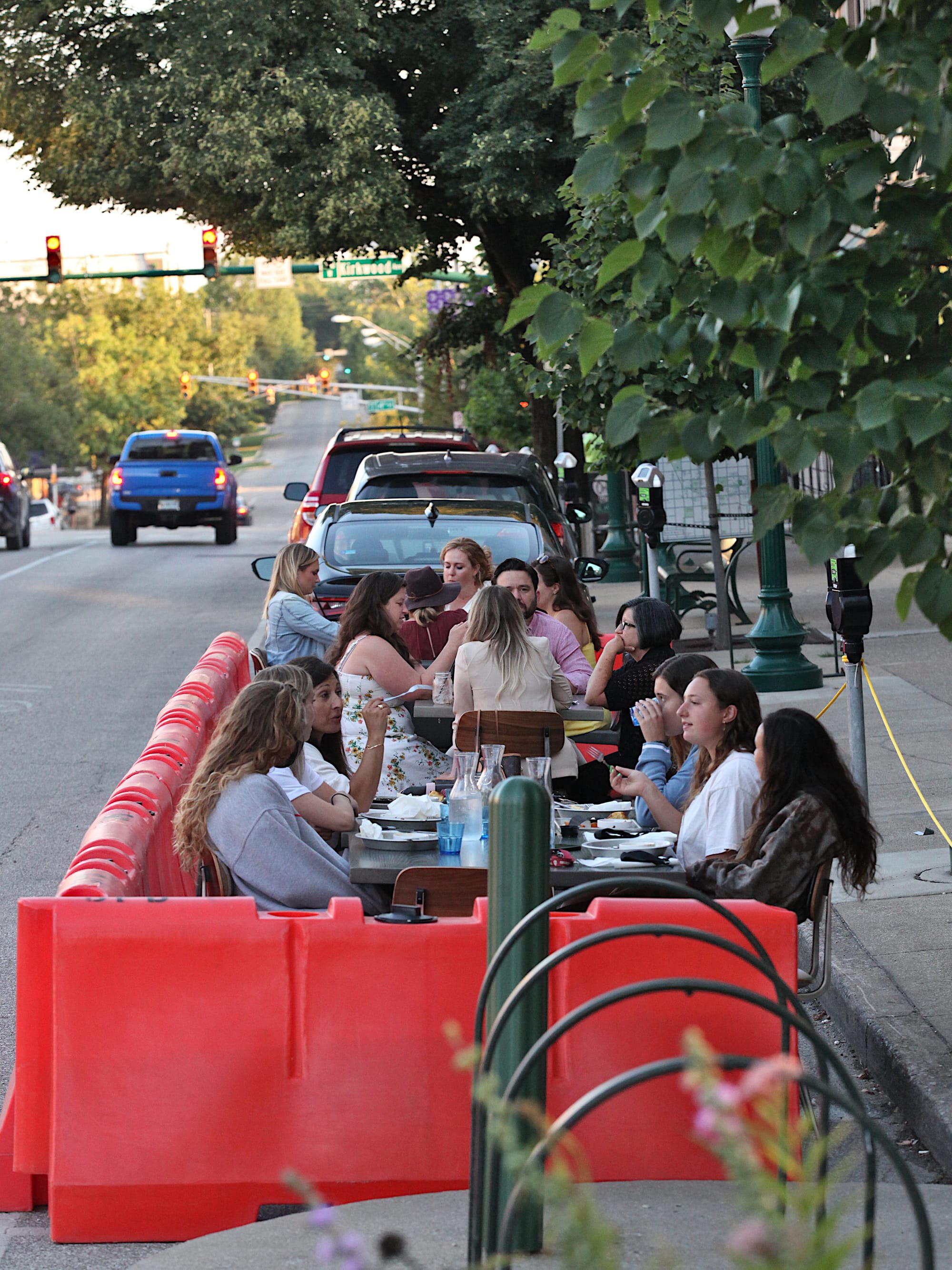
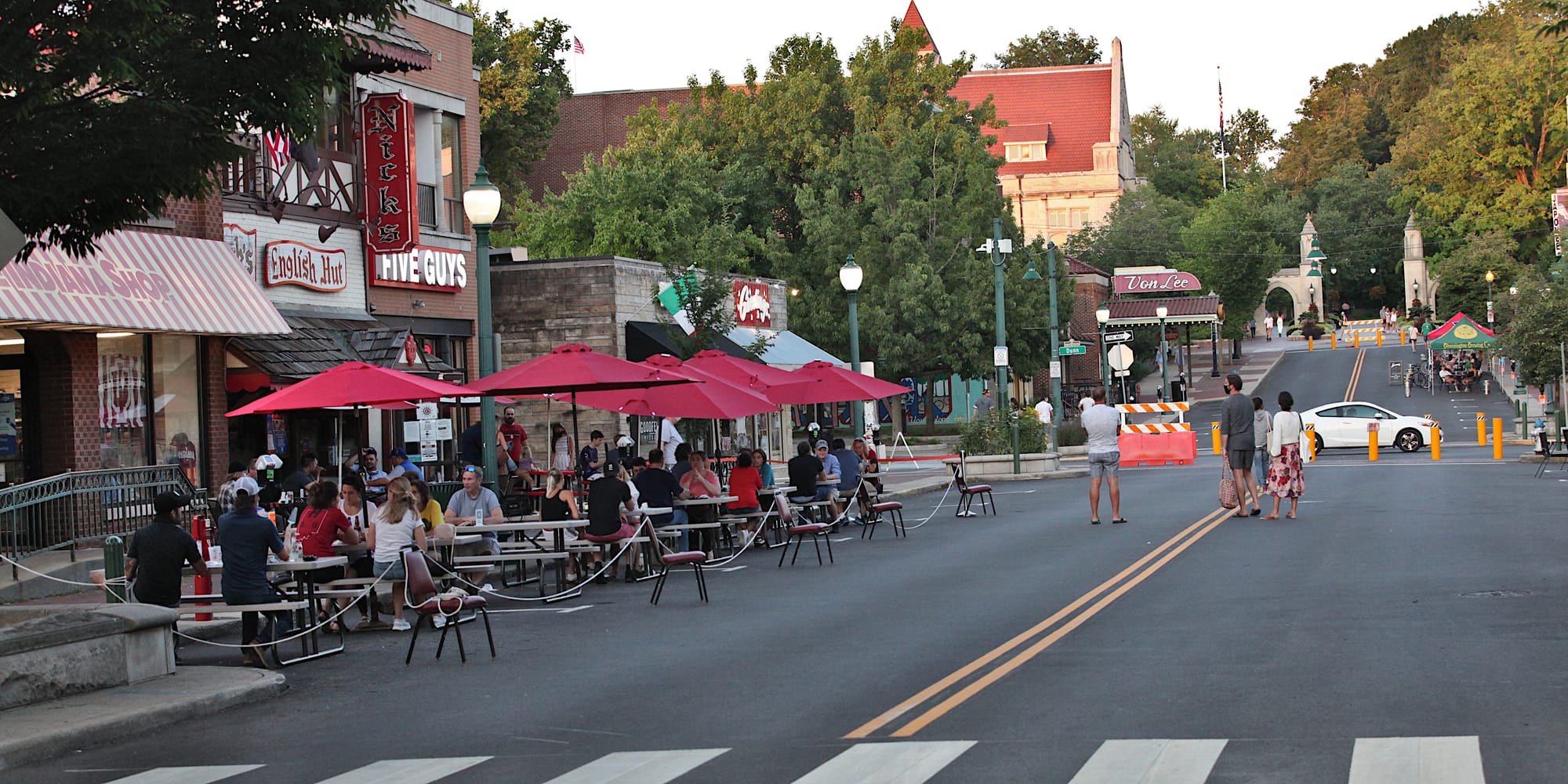
Starting in mid-March through the end of October, parts of Kirkwood Avenue in downtown Bloomington will again be closed to cars.
The closure will allow neighboring restaurants and retail stores to use the public right-of-way for additional seating and for display of their wares.
The city council’s vote last Wednesday means 2022 will be the third successive year for an ordinance that supersedes the usual local laws that apply to the use of public right-of-way. In 2020, the street closure was approved as a way to help area businesses recover from the impact of the COVID-19 pandemic. That’s part of the reason for this year’s closure, too.
The ordinance approved by the city council this past Wednesday does not permanently change city code.
Like last year, metered parking spaces in other parts of downtown could also be closed to cars, if neighboring businesses apply to use them as “parklets.”
What’s new this year, both for the Kirkwood Avenue closure and for the parklet program, are the fees that businesses will have to pay, in order to use the public right-of-way. In 2020 and 2021 no fees were charged to businesses.
While support from the city council on Wednesday was unanimous, attitudes among area business owners are not perfectly uniform.
The backdrop to the council’s deliberations included the idea of permanently closing Kirkwood. It’s an idea that goes back at least as far as 1973, when then-mayor Frank McCloskey revived plans for a pedestrian mall on Kirkwood Avenue, according to local newspaper coverage. That’s seven years before John Mellencamp recorded “Tonight” with its iconic line: “We’re gonna go walking down Kirkwood, look at us go.”
The sections of Kirkwood to be closed include the full block between Indiana Avenue and Dunn Street (500 block) and the full block between Dunn Street and Grant Street (400 block). Also to be closed is the west half of the block from Washington Street to Walnut Street (100 block), just off the courthouse square.
The seasonal closure of Kirkwood was implemented in 2020 as a response to the COVID-19 pandemic. The outdoor seating that was made available to restaurants was meant in part to compensate for the reduced capacity imposed by some of Indiana governor Eric Holcomb’s first emergency orders. In May 2020, restaurants could operate at no more than 50 percent of capacity, in order to enforce social distancing for patrons.
In early 2022, there are no longer pandemic-related indoor occupancy limits, on either the state or local levels.
The lack of any connection between reduced capacity in restaurants and the available use of the public right-of-way in this year’s program was a point of criticism during public commentary from Michael Carmin. He’s an attorney, but told the council he was speaking just for himself, not any client.
Carmin said he had not been in any restaurants recently that were restricting their seating, in order to maintain distance between patrons. He pointed out that there’s nothing in the ordinance that ties the ability to seat patrons in the public right of way, to the closure of certain indoor booths or tables.
That means the street closure and parklet program provides additional seating capacity, not replacement capacity, Carmin said. That makes the program a subsidy for just some local businesses, he said.
Carmin also objected to the fee structure for Kirkwood seating, which is tied to the seating capacity of the business, not the actual usage of the public right of way.
Businesses with a seating capacity of fewer than 20 seats would pay $500 for the seasonal permit to seat patrons in Kirkwood Avenue. On the upper end of the scale, businesses with a seating capacity greater than 100 seats would pay $3,500 for the season to use Kirkwood as a seating area.
The fees for parklets are $1,250 per parking space.
Drawing considerable talk from the city council was a $400,000 figure provided by Jane Kupersmith, Bloomington’s assistant director of economic and sustainable development. That’s the amount of “unrealized revenue” to the parking system each year caused by the program, according to Kupersmith.
The dollar figure is based on 155 unused meters for 210 days at a 95-percent use rate. Bloomington’s parking meters cost $1 per hour and are enforced 13 hours a day, from 8 a.m. to 9 p.m. [Shared Google Sheet with parking meter revenue by block face, parsed by The B Square from the 2016 annual report of the Bloomington parking commission]
The $400,000 figure generated skepticism among councilmembers as an accurate estimate of lost revenue, because typical occupancy might not reach 95 percent. In addition, a patron who can’t park on Kirkwood or in a parklet might park at a different metered parking space, which would mean no revenue loss.
The policy approach taken by Bloomington for other uses of metered parking spaces is to charge as a fee equal at least to the maximum revenue that would be derived from the parking meter.
During public commentary, Carmin pointed out that when a property owner needs to use metered parking spaces for a construction project, they have to pay the full amount the parking meter could have generated.
The city’s special events policy, which also applies to motor coaches that park outside downtown hotels, puts the fee at the greater of $20 per space or the hourly parking fee.
Kupersmith told the council that Downtown Bloomington, Inc. had conducted a survey of Kirkwood businesses to help staff understand the impacts of the previous Kirkwood closures. Of the 30 businesses who responded, 15 were in full support of the seasonal closure, Kupersmith said. Another nine gave qualified support, but five businesses were “wholly opposed,” she said.
Kupersmith summarized the general sentiment among businesses as largely supportive of the Kirkwood closure—as long as it is actively supporting businesses in their pandemic survival. Kupersmith also said that many of the stakeholders who have provided input said their support is only for a temporary program.
Advocating for more than a temporary program on Wednesday was Village Deli owner and president of the Kirkwood Community Association (KCA), Bob Costello. He told the council, “Most of the restaurants on Kirkwood, and some of the retail would not be open today, had we not had the opportunity to have outdoor seating.”
On the topic of a permanent closure, Costello said that he was not speaking as KCA president, but commented: “I’m an advocate for closing Kirkwood completely—and having only pedestrian traffic allowed.” Costello added, “But that’s another meeting, hopefully, further down the road.”
A feasibility study for the permanent closure of Kirkwood is a city goal by the end of September this year, based on the 2022 budget proposal from Bloomington mayor John Hamilton in fall 2021.




Comments ()